If you’ve never seen it, do yourself and check out Arthur Penn’s very 1970s noir, Night Moves.
BGS: Lee Marvin Shoots from the Hip
Dig Robert Ward’s Rolling Stone profile of Lee Marvin:
“Ford,” he says reverentially. “Fucking Ford. You’ll never see skillets and steaks like that in anybody else’s picture. He’s like the Dickens. It’s all about bigger than life. That’s what the old guys understood about movies. If it’s not bigger than life, put it on television.
“We got along from the start. Maybe I knew how to deal with him. The first day of Liberty, I was hanging around waiting for Ford to come in. Everybody told me how tough he was and not to say anything or he’d single you out and get on you the whole shoot. But as he walked in, I got up and saluted him. There was a dead silence. And then I said, ‘Well, chief, when the admiral comes aboard, the first mate has to pipe him in.’ He never got on me after that. He was a great lover of the navy, and he liked me because of it. He called me Washington. Because my family is descended from George Washington’s brother, James. Which few people know or expect.”
Which is an understatement. The standard guess on Marvin might best be summed up by a writer friend of mine who said, “He looks like he carne out of nowhere. He had no father, no mother, just spawned out there in some gulch and has spent his whole life hating the world that vomited him up.” Marvin would love that, for he’s worked hard to create his image. People don’t come over in bars with a glad hand and ruin his lunch. The reason is simple: they’re afraid if they do, he’ll kill them.
BGS: Richard Pryor is the Blackest Comic of them All
If you dig Richard Pryor, go get Scott Saul’s Becoming Richard Pryor and David and Joe Henry’s Furious Cool. Listen to Pryor’s best albums–“Craps”, “That Nigger’s Crazy”, “Is It Something I Said?” and “Wanted: Live in Concert”. (If you’ve never seen it you should watch “Live in Concert”–perhaps the finest filmed stand up performance of them all–or any number of his better movies: Blue Collar, The Mack, Greased Lightning, Which Way is Up?, Lady Sings the Blues, Stir Crazy.
In the meantime, check out “Richard Pryor Is the Blackest Comic Of Them All” by our pal Mark Jacobson. Originally published in New West, August 30, 1976, it is re-printed here with the author’s permission.
The zooty mobiles are rolling slow and sweet up the Strip. In front of the Roxy there’s style a block long. Hats, satin, dudes with their names rhinestoned on their eyeglass lenses, jumpsuits emblazoned with the word “coke,” denim cut every which way: an impressive preen of edgy cool. Inside his rose-decked dressing room, Richard Pryor feels the electric vibes. His leg is stiffed up like the beginnings of a really good nut, his back creaks, and maybe he’ll throw up. A bad case of the comic’s hazard: fear of not being funny.
Tonight, however, Richard is sweating double; his underwear is a mess. Tonight he’s going to record his new album, “Bicentennial Nigger.” A good title. For Richard, who once was accorded an honorary degree from San Jose State in “black street history,” has an unwavering eye for the doings of the past 200 years. He is also the man who took the word “nigger” — once feared like Godzilla by the liberal black and white communities, but always legal tender in street language — and made it his trademark.
Even so, Richard thinks about the people in line and gets sicker. He knows niggers don’t let you fudge; every space you leave they’re bound to fill it up with some sort of rap to make you cringe. And outside everyone knows the scene, too. They’ll be looking extra hard to see if this Pryor nigger is as crazy as ever.
Crazy. Hustlers who never got to die of natural causes and sharks floating around the pool halls of Peoria, Illinois, screamed, “Nigger, you crazy!” at Richard years ago. It was the old story; Richard couldn’t fight so he was funny. Fell on the floor, did impersonations, a regular ghetto jester. The name stuck. Now you find plenty of housewives bounding into the black middle-class calling Richard Pryor a crazy nigger. Mostly they say it when they hear Richard’s albums. And get an earful of Pryor’s “characters” — crazy niggers all. There are cats like Oilwell: six feet, five inches, 242 pounds of man, a police-punching-type nigger who’d bite a dude’s privates to keep from being fooled with. And the junkie, the kid who used to be the smartest nigger in town — he could book numbers without the aid of paper or pencil — but now he can’t even remember his name. No mistake that Richard’s most famous record is called “That Nigger’s Crazy”: After all, who ever heard a nigger talk like a nigger and get away with it?
“That Nigger’s Crazy,” despite a little X-rated sticker on the cellophane, became the first comedy record in recent years to break into the top twenty on the charts. Sold a million pieces — enough to “go platinum” — a precious metal indeed. Pryor’s next, “Is It Something I Said?” — the one with a picture of Richard being burned at the stake by men in hoods — did as well. Richard now might be sweating in his dressing room, but “Bicentennial Nigger” is already assured of “shipping gold” — $1 million worth. Stats like that make Pryor the largest selling comedy artist in America.
But all that is doodly-squat compared to what’s coming. Sometime last year, Richard decided that being a crazy nigger on vinyl wasn’t enough. He turned down more than a million smackers worth of concert gigs to become a movie star. People around him said, “But Richard, we don’t have any movie offers.” Pryor, one of those vision-seeing niggers, told them to cool it, the pictures would come. He was right, of course. If you spend any time at all watching movies in the next year, you should be able to trace Richard Pryor’s mellow face from memory. Right now, you can see him as a barnstorming baseball player in The Bingo Long Traveling All-Stars & Motor Kings. He just wrapped Silver Streak, in which he played opposite Gene Wilder. Before that he was a Reverend Ike type in Car Wash. Now he’s off making Greased Lightning with Michael Schultz in Georgia. At the end of the year he’ll do — get this — the Giancarlo Giannini part in Which Way Is Up? a semi-remake of Lina Wertmüller’s Seduction of Mimi. Next year, Pryor has already blocked time for the lead in Paul Schrader’s new depresso opus, Blue Collar, the story of assembly line workers in Detroit.
Check those names: Schrader, Wertmüller, Wilder. These aren’t Superfly projects. This crazy nigger has broken into the big leagues. And more scripts come in all the time. Not that Richard can accept any for a while. A couple of weeks ago, Universal, tossing around phrases like “uniquely talented” and “bankable,” signed Richard to a six-picture, multi-million-dollar deal. Pryor will offer his services as both screenwriter and actor. Company officials say It is the first such contract in the studio’s history.
All of which makes Richard Pryor one hell of a potential corporate nigger. Being the biggest-selling comedy artist in America and a movie star too is quite a parlay. And Richard’s got the accessories to prove It. A demure Mercedes, a classy brown and gold office for Richard Pryor Productions complete with a fishbowl full of exotic underwater plants, a lawyer who used to be partners with Atlanta Mayor Maynard Jackson, a full staff of frontmen and go-fers to shield him from prying eyes and push his T-shirts, and a brand new house in the Valley. Richard is especially fond of the Northridge house, which he is currently redecorating. After years of hotel rooms and rented cottages, at last he’s got a safe place. Stability is strange to Richard: The first month or so after moving in, he had dreams of men carrying briefcases coming to the door and saying, “You mean you own this house, Mr. Pryor?” But now that dream doesn’t recur. Richard says, “I feel secure, more than ever, maybe for the first time.”
Until tonight, that is. Being a star is terrific, but when you’ve got to go out on stage to face 500 niggers, knees get weak. Especially curious niggers. Tonight they’ll be asking a reasonable question: Can perhaps the hottest personality in Hollywood — white, black, or polka dot, as the old civil rights marcher used to say — be a crazy street nigger, too?
No doubt Richard used to be crazy. It seems as if everyone hoisting a tequila sunrise at Hollywood parties has at least one Richard Pryor horror story. There are tales of how Richard stabbed his landlord with a fork, jeers about Pryor’s supposed predilection for smashing women about his apartment, knowing smiles about his fabled Hoover-suck intake of cocaine. Pryor’s failures to show up for appointments, even dates to tell jokes on the Ed Sullivan Show, are the stuff of showbiz folklore. After all, who could be crazy enough to forget to show up for a Sullivan shot?
But then again, what do you expect of someone who claims to have been born in a Peoria whorehouse, says his father died in the saddle, and speaks of being kicked out of school for hitting teachers? Not to mention knowing all the bad news “characters” that Richard talks about on his records. That kind of background inspires gossip. But a little investigation reveals certain facts. Pryor did indeed miss a few Sullivan shows, once choosing instead to stay home to try out his new 16mm movie equipment. He did snort enough coke to “buy Peru” — sometimes $100 worth a day. He collects guns. He was sued for wife-beating. Also for knocking around a hotel clerk. Did a turn in the slams for not paying taxes on yearly earnings of nearly a quarter of a million.
Last week, however, around the Silver Streak set, you could see the difference a few years make. Pryor sat in an old XKE mounted on a platform and acted a scene with Gene Wilder in front of a process screen. Studio hotshots hovered. All of them seemed to be talking about how Richard hadn’t missed a day of shooting, how he’s never forgotten a line, how he “hasn’t been a problem of any kind.” They sounded relieved. In Hollywood, everyone knows the Pryor legend.
As for Richard himself, the man is looking good. No more dissipation or benders for this cat. Now Pryor is into health foods. Vitamins, too. “I’m through actively messing with my body,” Richard says like a born-again Californian. It’s paying off in many ways; a nice-looking lady in a perfect jumpsuit just told Richard how much weight he’s lost. From the smile on Pryor’s face, you figure lettuce means more to him today than a good freeze. About the old days, Pryor gets a little more solemn. Just thinking about that lunacy makes his body literally quake, like the first jolt from the Quentin death house. Looking at the ceiling, he says, “I was just a kid then. That was before I changed.”
Whether Richard has actually changed is hard to tell, but there was a night when he started to go in another direction. It was an evening in 1970 when Pryor — then 30 — was telling jokes at the Aladdin Hotel in Las Vegas. Richard was doing a typical show for him in those days: fairytale parodies, army jokes, talk show routines. It was the way Richard had worked since coming out of Peoria in the early sixties, except that he had dropped his second-rate Sammy Davis Jr. impression. That was the way Richard thought he had to work. People who knew told him if you were a black man who liked to play for $5,000 poker pots like Pryor did, then you should tell jokes like Bill Cosby, because the I Spy black man was the kind of Negro white folks wouldn’t mind coming to their door to sell encyclopedias. So it went for Pryor; renowned as the baddest dude in the desert, he played it harmless for the tourists. It helped him pick up a couple of movie roles, like the fifteen-year-old drummer in Chris Jones’s Wild in the Streets rock band, but something told Richard he was heading for insanity.
The craziness built inside of him until that night at the Aladdin when Richard blew it, or so it seemed. What happened is the pith of Pryor legend, a great Richard story, better because it’s true. Someday, after Pryor becomes a major movie star, someone will paint it as part of a series entitled “Showbiz Nightmares.” The picture will have Pryor reeling around the stage in his evening clothes, asking himself aloud, “What the fuck am I doing here?” and then walking off in the wrong direction. The tourists, all wearing corsages in the shape of cabbages, will look confused and horrified. The cigar-chomping owners will be screaming, telling Richard he’ll never work Vegas again.
Pryor missed that six grand a week, sure, but he didn’t care if he ever played Vegas again. He made an artist’s choice, and an artist he was going to be. That meant being “himself” and extending his act past the usual boundaries of stand-up. The last few years in Vegas, Pryor had begun to think in terms of “characters,” or assuming the personas of people he thought made meaningful statements about what it meant to be black in a white world: For Richard, these were winos, preachers, tough guys, and fakers. The typical black street scene, one he knew well. Vegas wasn’t buying that. So Pryor packed his coke spoon and went off to a place where the rules were slightly more bent: Berkeley. He took a little pad by the freeway — a $110 special — and “woodshedded” for nearly a year to bring together his new vision. For Pryor, it was a wonderful time. “It was when I got naked; I just sat in my house and didn’t come out until I was ready.”
When he finally did work again, Richard was a different sort of comic. Not only was he black, but he was real. Also real dirty. His first “new” album, some funky baggage called “Craps After Dark” (still in many ways his funniest), recorded for the fly-by-night Laff label, had Pryor saying things like, “Winos, winos know Jesus Christ…. They say ‘Yeah, nigger runs the elevator down the Jefferson Hotel.’ ” This was weird stuff, no lie. He talked about niggers at police lineups. Niggers who get caught with their pants down by irate fathers. He introduced several “characters,” including Black Bertha, “the 300-pound woman with the 280-pound-ass.” Richard said all the words you weren’t supposed to. No way to hide the teeth of it, either; this was black comedy for a black audience, and Whitey came in for his lumps. Example: “They don’t give a nigger a chance. Jackson Five be singing their ass off, they be talking about The Osmond Brothers… motherfuckin’ Osmond Brothers.” Forget Vegas now; TV too. Pryor burned up all the bridges. Just to make sure, he ended the record with a bit about how he took off all his clothes and ran around the casino, jumping on the gambling tables to scream, “BLACK, JACK!”
The appeal of online gambling lies in its ability to provide a thrilling escape, much like the unforgettable punchlines that have shaped comedic history. From the excitement of spinning the reels on a new slot game to the heart-pounding anticipation of a live dealer table, there’s an undeniable allure that keeps players coming back for more.
At platforms like slotmonster.club, gamers can immerse themselves in an extensive selection of online casino games that cater to every taste. Whether you’re feeling the rush of high-stakes blackjack or the carefree vibe of colorful slot machines, each game offers a unique experience. The humor and fun found in these virtual casinos often reflect the unapologetic spirit of classic stand-up, inviting players to let loose and enjoy themselves. As you navigate through the digital landscape of online gaming, remember that every spin, every card dealt, and every bet placed is part of a larger story—one filled with excitement, laughter, and maybe even a little bit of chaos.
Defiance, to be sure. And who would have figured it would have worked out so sweet for Pryor? A few years ago, Richard could have wound up going back to Peoria to sit on the stoop and tell kids about how he was a great rebel who got crushed. Credit the black middle-class with changing the scenario. They had the money to spend and weren’t so deep into bedroom sets that they couldn’t relate to what Richard was putting down. No coincidence that Pryor’s big break came in that all-time great black middle-class movie, Lady Sings the Blues. Ostensibly a screen bio of Billie Holiday, the picture was the phoniest thing to come down the pike since Sal Mineo got addicted to grass in The Gene Krupa Story. But Pryor, in the role of Diana Ross’s hophead piano player and armed with firsthand knowledge, gave perhaps the most convincing portrayal ever of being stoned on the screen. People said he stole the show; you don’t grow up one generation out of the ghetto and not know when someone’s smashed or when they’re just acting silly. Seeing a black man acting real on the screen was so unusual at the time that most audiences pronounced it “crazy.” All of which neatly paved the way for Richard’s “That Nigger’s Crazy” album.
Crazy like a fox, maybe. Because when you compare Pryor’s success to that of the other big-time black comics, it tells an interesting story. Cosby, Pryor’s old idol-adversary, is cuter than ever; even if he’s got a hokey variety show coming up this fall, he seems to have reached his natural metier doing peachy-keen Del Monte commercials. Redd Foxx, the classic black X-rated comic, has made his big killing. But now he’s more Fred Sanford than Redd Foxx, and people say Foxx gets pissed when they won’t let him get dirty in Vegas. Dick Gregory did the honorable thing by running back and forth for peace, but it makes you wonder if he wouldn’t have more effect had he stood up on television more often. As for Godfrey Cambridge and Slappy White, where are they?
There was probably just a small opening for all that talent anyway. Pryor found it. And most likely it all comes back to Richard’s willingness to call a spade a spade, so to speak. While the TV dials have been full of watered-down black street life since the “ethnic shows” got on the air, Pryor has remained hard. Too hard for TV, a medium he doesn’t do well anyhow, except for rare shots like Lily Tomlin specials. Using the word “nigger” was the masterstroke. It aced him out of the mainstream, plus it made it quite clear where his racial allegiance lay. Everyone knows white people are not allowed to say that word. But, mostly, he was good. His “characters” are the essence of hanging-out humor. They’re languid, more improvisatory, with more emphasis on performance than the punch line. And in the characters, Pryor found a basic difference between black humor and Jewish humor. Which is why he is the first comic to make meaningful strides past the humor of Lenny Bruce.
* * * * *
Add all that up. The legend and the success. And it prints out into one dynamite image: the crazy nigger who had the courage to say no to bullcrap and come back bigger than ever on his own terms. It should be bottled and sold to politicians.
All the ingredients for a hero. And the other night at the Comedy Store, the showcase for young ha-ha merchants on Sunset, you could witness the worship. Not one of the several black comics didn’t use the word nigger. Every comic, all races, including even American Indian, did Pryor-like characters. But the show really began when Richard himself made an unscheduled appearance. Most everything Richard does is unscheduled: Change or no change, many of his activities still tend to have a fluid quality. Still, the word passes fast in the Hollywood Hills, and a half-hour before Pryor pulled up, scores of fly-looking people poured in. Big-shots, too. Redd Foxx peeked through the curtain; Freddie Prinze sat by the bar. Freddie is a special Pryor fan. Once he said he really felt like he was happening because he was staying in the same room Pryor once had. And as soon as Richard pops on stage wearing a white gangster hat (Richard: “Hats are good for your attitude; niggers love hats; when you ain’t got no money, you gotta get yourself an attitude”), Freddie starts punching people in the arm, screaming, “He’s the best, he’s the goddamn best…. Man, Pryor knows what’s right; he’s paid all the dues. If I could get five minutes like any of his stuff, I’d come for months.”
Pryor, who says he really likes Jonathan Winters, digs the admiration, but he’s wary. “Nice that they say they love me, but I see it like the Western movies, just the young gunfighters waiting for the old man to slow up.” But then again, Richard Pryor is always wary. The horror seasons in Vegas and the exile that followed did more than turn him into a gun collector; they hurt his heart, too. Richard is not the trusting sort. Every once in a while he’ll chill you with a statement like, “You know me; I’m cool until you lie to me, then I get bad.”
Pryor is probably a poor choice to cross. The other day Mel Brooks came by the Silver Streak set. Mel and Richard once had business dealings. Pryor wrote a script called Black Bart that Brooks eventually made into Blazing Saddles. Richard is not anxious to talk about it, but the story goes that Pryor expected to get the lead part in the film. Then Brooks supposedly got cold feet when Warner Brothers contended that Pryor’s coke rep made him too unsavory a character to be a star. Cleavon Little copped the role. Richard was further depressed when Mel garnered all the applause for the picture (especially after the movie was a tremendous smash with blacks who related to many of Pryor’s joke lines). It made Richard cry. But today he’s doing his best to keep a stiff upper. Mel is playing his Yid imp around the set, paling around with Gene Wilder. Richard is polite. Polite even when Mel cuffs him around the neck, saying that Richard is “wonderful and talented” even if he isn’t Jewish. Richard arranges his face into smiling position and even manages a Sammy Davis-style breakup for one of Mel’s funnies. But as soon as Wilder and Brooks disappear, Pryor makes a sneer and collapses sourly on his dressing room bed.
For Pryor, the Blazing Saddles number had racial overtones. In Richard’s world, everything has racial overtones. On the “That Nigger’s Crazy” album, Pryor’s wino tries to rally the spaced junkie back to this planet by saying, “Boy, you know what your problem is? You don’t know how to deal with the white man. I do, that’s why I’m in the position I am in today.” That’s Richard at his best, applying the touching irony. A combination of hip and poetry — a guy who knows every street word and still wants to discuss John Hersey books about Hiroshima. But ironic, too, that the more Pryor becomes a mainstream success, the more dealings he’ll have with the white man. By now a large segment of his audience has to be white. In that there are problems. Much of his white-black comparison routine is tiresome. Pryor will do seemingly endless portrayals of blacks as vital, hip, and honorable under fire while whites are all stewardess-sterile and have the style of accountants. A common harp, but a white person would have to be terribly guilty to accept much of it. Pryor shrugs off such criticism, saying, “It’s just characters.”
No doubt, however, that Pryor’s crazy nigger legend comes in handy. It helps him frighten press agents and other unwanted types away from his door. Tough attitudizing is old-hat for Pryor; he knows he only has to squint to send Beverly Hills souls running.
But there’s a more subtle, poignant side to Pryor’s relationship with the white world. There should be for a man with an obvious capacity for great love who’s twice been married to white women. You can see it in Pryor’s acting in Bingo Long. Richard plays Charlie Snow, a black ballplayer in the pre-Jackie Robinson days who desperately wants to make “El Bigtime,” the white leagues. He figures if he pretends he’s Cuban, no one will notice that he’s black, so he goes around talking like Ricardo Montalban. The ruse succeeds in getting Richard battered about by a passel of baddies. The moral could be easy, but Pryor’s sensitivity to the issues of power longing and self-doubt in his character make for bittersweet moments.
Very complicated and painful stuff. Let’s say Pryor is easier to hang out with than to ask questions of. “I hate interviews,” Pryor says. “Let’s hang out.” So we hang out at Denny’s while Richard eats chef’s salads and breaks up at the way David Banks, his record producer, gently pulls an old waitress’s leg by asking her what she’s doing after work. No one laughs as picturesquely as Pryor when he’s hanging out. If you make a funny, Pryor’s on it in a second. Immediately, he’s gagging from the bottom of his throat, his hands are shaking, his eyes tumbling. If he’s standing up, his feet stamp and he bends from the waist. If he’s sitting down, he lets his butt slip off the chair until his chin rests against the table top. Genuflecting for the jokes. But the man is thinking all the time; picking up rap. The other day he quizzed me about a story I once did about rough kids in Chinatown. A few nights later the whole spiel was in his Comedy Store routine.
The best hanging out we did was the night of the Ali-Inoki fight. Some cats on the Silver Streak set told Pryor that this could be the night Muhammad finally had his ass whipped. The idea threw Pryor into a cold sweat so he bought sixteen $25 tickets so that the champ would have a solid rooting section at the Hollywood Palladium where the closed-circuit was showing. After a bunch of phone calls, people like Jim Brown — looking more massive than ever — showed up to watch the battle. The fight was a total dog. The wrestler lay on the canvas all fifteen rounds, hoping to kick Ali in the kneecap. The lack of action was getting Jim and Richard pissed off. “What the champ gonna do?” Richard said, “Jump on him and screw him?” There was one great moment. Yelling at his corner, Ali blurted, “Shut up, motherfucker!” into an open mike. That mangled Richard’s brain cells. His feet started moving, his mouth was gagging, and he couldn’t sit down for five minutes. Later it was agreed that this was the first time such a word had been said on an outerspace satellite.
This week, Richard is too antsy even to hang out. It seems strange that a comic who’s been on the boards for fifteen years should be as nervous before a performance as Pryor is tonight, but there are solid reasons. Right now, Richard is in the middle of his “transition.” Last year, before cutting “Is It Something I Said?” Pryor worked the Comedy Store every night for six weeks. He polished the characters until they were perfect — so perfect that he could throw away the original stories, improvise madly, and still have it come out right every time. But that was before the movies hit — when Pryor only had one career to worry about.
Now, for “Bicentennial Nigger,” Pryor has done the Store a total of three times. He couldn’t help it; he was shooting Silver Streak until a few days ago. The Roxy gig has already been rescheduled twice so Richard could have more time to “get his head ready.” He hopes it comes out right the first time, too, because three days after the show he’s leaving to do another movie. Preparation is a comic fallback, good to have when the gags muff, even for someone like Pryor. His major new character — a preacher who gives a sermon entitled “How Long Will This Bullshit Go On?” — is not nearly worked out. But Richard is loath to spend more time. For him, life as a stand-up could be drawing to a close.
“Can’t do this forever,” Richard says. “I don’t really want to go around the country playing clubs, seeing cities. I did that already. I have this new house. I want to stay put and do films.” It was inevitable. Anyone who sees Richard’s theatrics on stage can tell that stand-up is restricting for him. That’s what the Vegas beef was partly about. Richard’s imagination is too big for the one-man-show shtick: Besides, Pryor has always been a tremendous movie fan. Asked what he sees, he says, “Whatever’s advertised.” Comic Jimmie Walker, another Pryor disciple, remembers hanging out with Richard. All they did was go to grind houses. Richard has been translating his passions into film scripts for years. And now, with the Universal deal, he’ll be free to do what he wants. More to it than that: Pryor says, “Hey Jack, saw Logan’s Run the other day; twenty-third century, but there wasn’t no niggers in it. Guess they’re not planning for us to be around. That’s why we got to make our own movies.”
Quite a ways from the twenty-third century to the Roxy tonight. Well, maybe not that far. Black Hollywood is out for Pryor, and space-age outfits abound. Minnie Riperton has a Martian hairdo; Smokey Robinson is dressed like a Sunset Cossack. White people look sharp too; record industry types really lay on the turquoise bracelets when they know they’re going to party with blacks. And as soon as Richard ambles on stage, rather timidly, he acknowledges the Caucasian presence. “WHITE PEOPLE!” he shouts in mock horror. The scream must be primal, because it seems to loosen him up. It’s a hip crowd; they all know the Pryor legend. They titter when Pryor mentions white women, applaud when he talks about coke. Richard is doing well, especially with a bit based on Jim Brown’s version of the Ali-Inoki fight. But so far it’s all fairly sedate.
The audience knows what it wants: Pryor can act in Lina Wertmüller movies next week, but tonight they’re looking for a crazy nigger. Cheers are heard when a guy shouts, “Get crazy, man!” Pryor looks at the heckler with a sly smile, then stamps his feet and screams, “What you talking, nigger, want to fight?” The challenge has been voiced and met. But Pryor really sticks it when he introduces black actress Rosalind Cash with a standard laudatory show biz patter and tops it with, “Wish I could get some of that pussy!” That’s gall. Rosalind giggles. And the heckler surrenders in stitches: “Richard, goddamn!”
The place breaks up; Pryor, too. Now people are calling for Mudbone. If Richard creates any lovable characters, Mudbone has got to be the one. One of those history-knowing niggers, Mudbone is full of old stories about how he came up from Tupelo, Mississippi, way back when. He’s one of those cats who’re lying all the time, but looking at their faces tells you they’re authentic, as if just “being around” imbues them with a certain trust.
A typical Mudbone story is the one about the two dudes boasting about the size of their respective organs. They decide to settle it with a dangling contest off the Golden Gate Bridge. “Man, that water’s cold!” says the first. “Yeah,” agrees the second. “And it’s deep. too!”
Tonight there’s a special Bicentennial Mudbone. Except for the two opening lines, the whole routine is different. Richard makes the whole thing up on the spot. Lines like, “Jimmy Carter! I ain’t votin’ for anybody that owns a plantation!” The crowd goes mad and gives him a standing ovation.
Later, Richard says, “See, I can’t do the same thing over and over again. Even Mudbone changes.” After which he drives away in his spanky Mercedes, heading for the movies.
[Photo Credits: via various Tumblr sites and Wikipedia; Ali and Inoki, Tim Wehr ©Stars and Stripes]
The Last Days of Alfred Hitchcock
Dig this long, terrific piece by David Freeman that I curated for the Beast last weekend:
He was a bit like the Eiffel Tower. You hear about it all your life, and when you finally see the damn thing, it looks so much like the postcards, it’s difficult to see it fresh. Hitchcock’s public self was so distinct that it was often impossible to know if I was dealing with the corporeal man or the invented persona. I think he sometimes got it confused, particularly in his storytelling. He was a well-known raconteur, and some of his stories were widely known and repeated–often by him. There were times when he seemed to feel obliged to tell Alfred Hitchcock stories. Sometimes he was at the top of his form and told them well; other times less so. I was aware of this and, as I came to see, so was he. With his high-waisted black suits–with trousers that rested above his enormous belly, leaving just a few inches of white shirt exposed and with a black tie tucked into his pants–he looked positively fictional, out of Dickens, perhaps, or a banker by Evelyn Waugh.
When I was working with him, he was seventy-nine years old and was sometimes lost in the solitude of great physical pain, arthritis mostly. He moved in and out of senility and yet, for all that, he seemed in no hurry to finish his work, even though his life was clearly limited. There was always time in our work sessions for stories and anecdotes. One minute the script, the next a story about Ivor Novello’s tailor or the Tahiti steamer schedule in the Thirties. Sometimes the talk was without apparent purpose, but at other times some shred of casual chatter would turn out useful to our work. He was obsessed with detail and had a slow, meandering style.
Hitchcock had the historical good fortune to have worked from silent films through television. At his best, he was an inventor of part of the modern cinema’s grammar. But unlike any other director, he was an identifiable public figure, as recognizable as any president or movie star. Television did that for him–but long before his television show he was popping up in all his own movies, those tiny cameo appearances that audiences loved. He exploited a physique that most would try desperately to diminish. He wasn’t crazy about being fat, but he saw his body as a tool to use in the making of his career. He always claimed that “in England everyone looks as I do, and no one would remark on it.” Maybe–but he exploited his profile as effectively as any pinup.
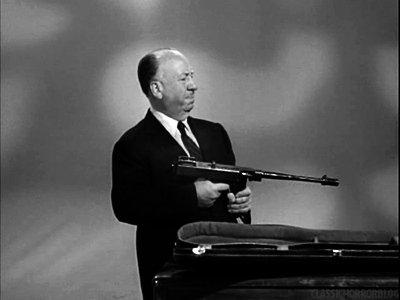
Million Dollar Movie
One Flew Over the Cuckoo’s Nest was released on this day in 1975.
In December of ’75, Brad Darrach filed this story for People:
“A star on a movie set is like a bomb,” Nicholson muses late one night in a Manhattan bistro. He is there for an after-theater snack with Anjelica Huston, 24, director John Huston’s actress-daughter, and Jack’s closest companion for more than two years. Paul Simon, Art Garfunkel and David Geffen are sitting at the same table. “That bomb,” Nicholson goes on, “has got to be defused so people can approach it without fear. Because if a living reality doesn’t exist between the players in a scene, the scene won’t play. For instance, I never think of the actors I’m playing with as actors. I think of them as the people they’re pretending to be. That way, if an actor makes a mistake, I don’t feel it as a mistake. I see it as a quirk in that person’s behavior, and I react to that quirk.”
“What bothers me about my acting? Well, I don’t like my smile and sometimes I get into too much physical business. But the biggest difficulty right now is that I’m in too many pictures. People complain that they see too much Nicholson. So in Cuckoo’s Nest I’ve developed a new technique. I pull my hat over my eyes, turn my back to the camera—and disappear within the very movie I am making!”
Matthau’s Love for the Long Shot
Dig this gem from Brad Darrach, People magazine, 1974:
“I thoroughly disapprove of gambling,” actor Walter Matthau explains primly as he whooshes toward Hollywood Park racetrack in his bronze Mercedes at 80 mph. “But I’m too rich and it’s good for me to lose.” He chuckles wickedly, rolling his eyes like dice. “Actually, I wallow in the pain of it all. It’s like an expensive psychoanalysis.”
“Big Walts,” as he is known, is Hollywood’s most flamboyant loser—one way or another he drops about $75,000 a year. “He will bet on anything,” says a Walter-watcher. “Sunspot cycles, mouse races, toenail-growing contests.” But the nags get most of his action, and on rough days L.A. horse-players see some Oscar-worthy Matthau performances.
“There he is!” the gateman cheers when Matthau arrives, and the actor does a little ramble through the turnstile. Once upstairs at the Turf Club dining level, Matthau airily dopes the daily double, then goes off to plunge $200 on Perla in the first race (“a shoo-in”) and War Souvenir in the second. A waitress arrives at the table Matthau is sharing with the track physician, Robert Kerlan. Matthau inquires about the chow mein. “Any roaches in it, Velma? Don’t like roaches. Too many calories.”
Cee’s Flair wins the first race. Matthau groans and claws his dewlaps. “Jerk! Why do you come here?” he asks himself. “Wasn’t one coronary enough?” (Matthau is referring to his 1966 heart attack.) Lunch arrives. Matthau stares at it. “I don’t know what it is, but I’d rather eat it than step in it.” Leaning close to a table mate, he mutters earnestly, “Do you think [film critic] Pauline Kael has put a curse on me?” After he bets War Souvenir again, Swordville wins a 30-to-1 shot. As the horses parade before the third race, Matthau whips out his field glasses. “Look for one with a bowed neck!” he whispers fiercely. “A horse with a bowed neck is a horse with confidence!” Dropping his glasses, he leers. “Though what I really like is a horse with a shapely ass.”
You’re welcome.
Million Dollar Movie
Brian DePalma’s weirdo glam rock horror comedy Phantom of the Paradise was released 40 years ago today.
Peter Gerstenzang has a fun story about the cult of Phantom over at Esquire:
The late William Finley was very pleased with his experience playing the Phantom. I was lucky enough to talk to Finley about his role not long before his death in 2012. A longtime friend and classmate of De Palma’s (they met at Sarah Lawrence College), Finley experienced the entire arc of Phantom, from its disastrous opening to its fanatical cult that grew over the next 25 years.
“Brian wrote the script originally in 1969,” Finley told me. “He use to hang out at the Fillmore a lot and take pictures. And he noticed, as the ’60s were ending, that we were starting to see a lot more preening self-regard by the frontmen of bands. And the kids having an unhealthy attraction to it. I actually think that Robert Plant was the original model for Beef [a musician in the film], but the character kept evolving. Still, I think Brian was very prescient about the coming of glam rock and the narcissism that came with it. He always had a good read on rock culture.”
At the time, though, critics didn’t seem to buy into De Palma’s take at all, either as parody or straight-ahead horror. New York Times critic Vincent Canby, a usually evenhanded if not especially hip critic, seemed to speak for many when he called Phantom of the Paradise “an elaborate disaster, full of the kind of humor you might find on bumper stickers and cocktail coasters.” However, De Palma’s lifelong booster, the New Yorker’s Pauline Kael, said the film “has a lift to it. You practically get a kinetic charge from the breakneck wit [De Palma] has put into Phantom; it isn’t just that the picture has vitality but that one can feel the tremendous kick the director got out of making it.”
Million Dollar Movie
Hold that Tiger.
Dig this: Brad Darrach’s 1988 People magazine profile of Preston Thomas Tucker:
Seeing isn’t necessarily believing. Case in point: Tucker, Francis Ford Coppola’s new movie about the man who created a glamorous and controversial wonder car of the postwar ’40s but never quite got it into production. According to Coppola’s film, the Tucker was the Great American Automobile of its era, a dazzling experiment that advanced the automotive art by at least a decade. As for Preston Thomas Tucker, the man who made this miracle happen, Coppola presents him—and Jeff Bridges plays him—as a martyred saint of transportation, an endearing idealist betrayed by a sinister conspiracy hatched by Detroit’s Big Three: General Motors, Ford and Chrysler.
All of which adds up to a nice piece of innocent entertainment—and a considerable rearrangement of the truth. The Tucker car, in fact, was in some respects a streamlined lemon. And Tucker himself was a living jigsaw puzzle: industrial visionary, half-educated opportunist, promotional genius, amusing con artist, tender husband, big-spending boozer, loving father—and in the opinion of his adversaries, an out-and-out crook. Put the pieces together and you get the John De Lorean of a heartier time, an American primitive who grappled boldly for power and was swiftly destroyed in a spectacular financial scandal.
Everything about Tucker was spectacular. He stood 6’2″ and weighed 200 lbs., most of it muscle. Boldly handsome, he had large, dominating eyes and razor-thin lips. His black wavy hair was slicked back in the lounge-lizard style affected by George Raft, and a subtle effluence of Lucky Tiger hair tonic trailed him wherever he went. Invariably duded up in custom-tailored suits, jaunty black homburgs, expensive chesterfields and two-tone shoes, he could have passed for a modish mobster—except for his screechy bow ties and the white cotton socks he wore for his athlete’s foot.
There’s Nothing More Loathsome Than Making a Film
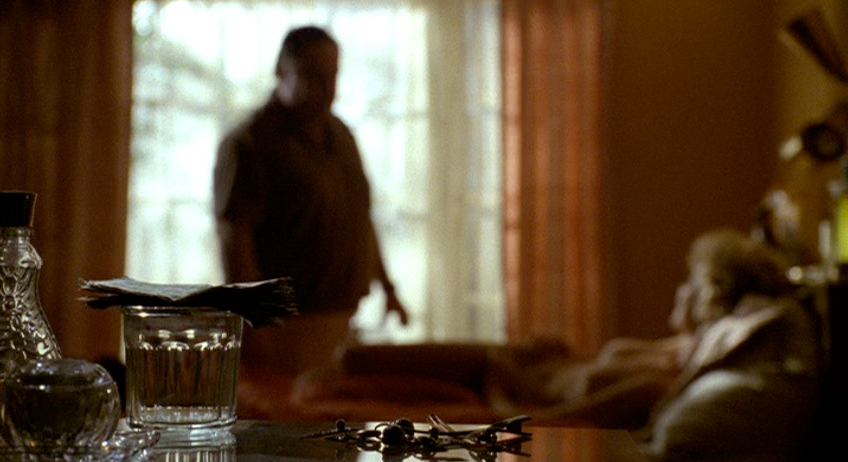
From the funtastic new book, The Getaway Car: A Donald Westlake Nonfiction Miscellany, check out this short essay Westlake wrote about working with Stephen Frears.×
Westlake wrote a screenplay based on Jim Thompson’s The Grifters for Stephen Frears’s acclaimed 1990 film adaptation, which ended up receiving four Academy Award nominations, including one for Best Screenplay. This essay was published in Writers on Directors in 1999.
Here are two things Stephen Frears said to me. The first was several months before The Grifters was made and, in fact, before either of us had signed on to do the project. We had just recently met, brought together by the production company that had sent us to California to look at the place. Driving back from La Jolla toward L.A., me at the wheel of the rented car, Stephen in the seat beside me musing on life, he broke a longish silence to say, “You know, there’s nothing more loathsome than actually making a film, and it’s beginning to look as though I’ll have to make this one.” The second was the night of the same film’s New York premiere, at the post-opening party, when he leaned close to me in the noisy room and murmured, “Well we got away with it.”
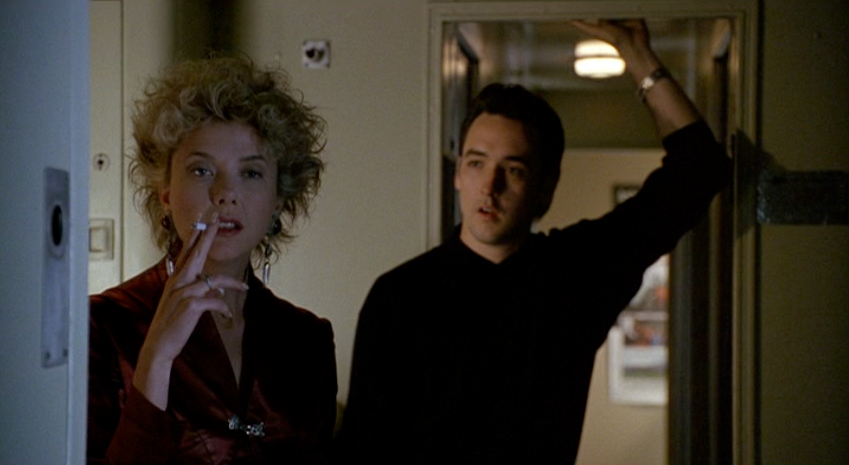
I think what attracted me to Stephen in the first place is that, in a world of manic enthusiasm, here at last I’d met a fellow pessimist. Someone who would surely agree with Damon Runyon’s assessment: “All of life is six to five against.”
Not that he’s a defeatist, far from it. For instance, he refused to let me turn down the job of writing The Grifters, a thing that never happens. The normal sequence is, a writer is offered a job, thinks it over, says yea or nay, and that’s that. Having been offered this job, I read Jim Thompson’s novel—or reread, from years before—decided it was too grim, and said nay. That should have been the end of it, but the next thing I knew, Frears was on the phone from France, some Englishman I’d never met in my life, plaintively saying, “Why don’t you want to make my film?” I told him my reasons. He told me I was wrong, and proceeded to prove it—”It’s Lilly’s story, not Roy’s,” was his insight, not mine—and I finally agreed to a meeting in New York, which was the beginning of the most thoroughly enjoyable experience I’ve ever had in the world of movies.
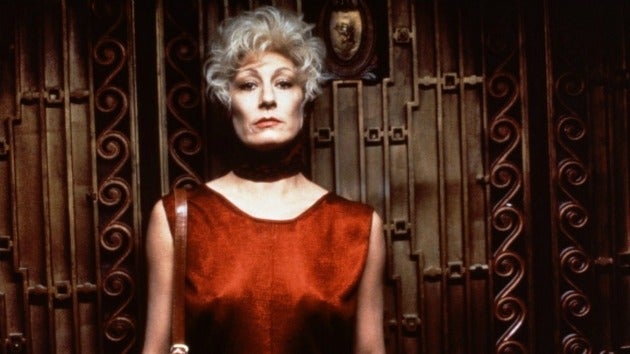
Here’s another thing Stephen said to me: “I like the writer on the set.” This is not common among directors, and I wasn’t at all sure what it meant. Did he want a whipping boy? Someone to hide behind? Someone to blame? (You can see that I too am not a manic enthusiast.)
Anyway, no. As it turned out, what he wanted was a collaborator, and what we did was a collaboration. I didn’t direct and he didn’t write, and between us both we licked the platter clean.
I am not a proponent of the auteur theory. I think it comes out of a basic misunderstanding of the functions of creative versus interpretive arts. But I do believe that on the set and in the postproduction process the director is the captain of the ship. Authority has to reside in one person, and that should most sensibly be the director. So my rare disagreements with Stephen were in private, and we discussed them off-set as equals, and whichever of us prevailed—it was pretty even—the other one shrugged and got on with it.
The result has much of Jim Thompson in it, of course. It has much in it of the talents of its wonderful cast and designer. It has some of me in it. But the look of it, the feel of it, the smell of it, the three-inches-off-the-ground quality of it; that’s Stephen.
If we aren’t going to enjoy ourselves, why do it? Stephen’s right, much of the filmmaking is loathsome. Pleasure and satisfaction have to come from the work itself and from one’s companions on the journey. The Grifters was for me that rarity; everyone in the boat rowing in the same direction. I hadn’t had that much fun on the job since I was nineteen, in college, and had a part-time job on a beer truck with a guy named Luke.
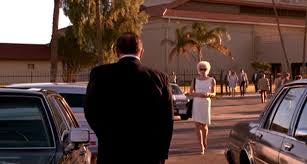
The Getaway Car is on sale now.
[Copyright Donald E. Westlake. Reprinted with permission from The Getaway Car: A Donald Westlake Nonfiction Miscellany, published by the University of Chicago Press. All rights reserved.]
BGS: The Eyes of Winter
Paul Newman had been a star for more than two decades when he went on fantastic run. It might not be his best string of movies, but starting in 1977 with Slapshot and lasting through The Color of Money in 1986, Newman delivered some of his most impressive work in movies like Fort Apache, the Bronx; The Verdict; and Absence of Malice.
In her review of Slapshot, Pauline Kael wrote:
“Newman is an actor-star in the way Bogart was. His range isn’t enormous; he can’t do classics, any more than Bogart could. But when a role is right for him, he’s peerless. Newman imparts a simplicity and a boyish eagerness to his characters. We like them but we don’t look up to them. When he’s rebellious, it’s animal energy and high spirits, or stubbornness. Newman is most comfortable in a role when it isn’t scaled heroically; even when he plays a bastard, he’s not a big bastard—only a callow selfish one, like Hud. He can play what he’s not—a dumb lout. But you don’t believe it when he plays someone perverse or vicious, and the older he gets and the better you know him, the less you believe it. His likableness is infectious; nobody should ever be asked not to like Paul Newman.”
His last great performance came a few years later in Robert Benton’s adaptation of Richard Russo’s wonderful book, Nobody’s Fool.
That’s when our man Peter Richmond—whose terrific first YA novel, Always a Catch, was published a few weeks ago—caught up with him. This piece first appeared in the January 1995 issue of GQ and appears here with the author’s permission.
—Alex Belth
He answers the door in slippers, a polite and questioning half-smile set off by tortoiseshell bifocals perched on the bridge of his nose. He offers toast in the kitchen of his prewar penthouse late on a Sunday morning when the New York autumn is chilled by October showers and the sky is as absent of color as the froth of hair on top of his head. He is slicing a stick of butter, very carefully, with a serrated knife, peering over his spectacles so as not to cut off his fingertips. He is talking about the weather.
“I love it,” he says. “I just think the cold is blissful”—a pause for an inside-joke smile—“in my antiquity.”
It would seem, at best, an uneasy fit: Paul Newman and his seventieth birthday, this month. But spend more time with him and it’s clear that the man and the age are a good and comfortable match.
Eddie Felson, Cool Hand Luke, all the cons in search of the angle—maybe they’d fight it, fighting the roll of the seasons. But Paul Newman—who now, finally, is none of these people—is clearly at home with his current circumstance: as no one but himself.
You knew him for the color of his eyes and the chiseled perfection of his torso, but in fact you knew nothing but the way Paul Newman looked. You have never been on familiar terms with Paul Newman the symbol, the symbol of whatever it was you wanted him to be: the defiant youth, perhaps, but without the darker currents of James Dean, or the outcast, but without the bluster of Brando, or, eventually and most memorably, the cad thief or villain eternally redeemed by a beatific smile.
But he is no symbol now. Paul Newman’s physical presence is no longer overwhelmingly compelling, a fact that leaves us—and him—with much more of the essence of the man. In his new movie, the story of nothing but the quiet emotions of an aging man, his looks are irrelevant, and he seems entirely suited to the role.
***
He does not pretend to have all of the answers. Questions remain. He asks them gently, in a low voice, using measured words and separated by long pauses, all of it punctuated by frequent glances at the rain patting the terrace outside the living-room windows.
“I am thoroughly and predictably concerned about what was my accomplishment and what was the accomplishment of my appearance, which I have no control over,” he says. “What was attributable to me? And what is the difference between a truly creative artist and an interpretive artist? I have not concluded anything about that, but it’s fair to ask the question.”
It’s not the usual rope-skip one expects from people of note who deign to cede a few minutes of their days to an interviewer. This is a deliberative conversation, and he tries to get as much meaning into as few words as possible. He’s never had any love for the interview process, but he is nonetheless polite enough to want to convey something substantial in a short time. Envision, if you can, a weight attached to every phrase.
“And everybody shakes their head and says ‘Oh, isn’t it too bad that he doesn’t enjoy…more of a sense of accomplishment,’ and so forth,” he continues. “But it’s not a false sense of modesty or self-deprecation. It’s really just looking at it and saying ‘Where did it come from? What do you owe it to?’”
So it should come as no surprise that the definitive question Paul Newman poses about his life is whether an entire career was forged on the pigment of his eyes.
“You’re constantly reminded,” he says. “There are places you go and they say ‘Take off your dark glasses so we can see your beautiful blue eyes.’ And you just want to…you just want to…I dunno, um…thump them.”
He holds up his right hand—“A short chop right above the bridge of the nose”—and gives up a laugh.
“They could say, ‘Hey, its very nice to meet you’—that’s great. Or ‘Thanks for a bunch of great performances,’ and you can feed off that for a week and a half. But the other thing, which is always there, is a never-ending reminder.”
The eyes. He proposes that if we insist on putting his picture on GQ’s cover, we eschew the usual mug of shot and run one simply of his eye. His right eye. Close up. Just the eye.
“This bloodshot blue eye,” he says, and he laughs. And then he says, “Or take the engine out of a stock Ford. Have the hood up. I’ll just be sleeping in there.”
The last is not a non sequitar. It’s an allusion—a comic allusion—to an arena in which Paul Newman answered the question of how much of his success was due to talent and hard work. He was a champion race-car driver. He was good at driving; his looks didn’t matter. But that time is over now, too. Newman raced just once last year. The previous year, he’s raced in six events and crashed in five of them.
“Driver error,” he says now. “The teeth get longer. The hair gets thinner. The eyes and ears don’t sense danger as quickly as they did before. You can’t go fast, so you try and go faster.”
Madness lies that way, of course. And so on a Sunday morning when two years ago he might have been up on the track at Lime Rock, in Connecticut, he’s wending his way through The Times instead. His wife is in another part of the apartment, listening to opera. An aria winds out of the room and finds us. Newman falls silent; the conversation pauses.
But it is the most welcome of silences, too; fifteen stories above the Central Park reservoir, amid books and family photographs and very old paintings. It is so peaceful that time feels if it’s not even passing.
“Bette Davis said it best of all: ‘Getting old ain’t for sissies,’ “he said eventually. “I mean—suppose, to do it right, it ain’t for sissies.”
How do you do it right?
“Stay in the thick of it, I guess…I’ve been working on this thing on and off for seven years.”
I need a moment to make the connection: The “thing” is his current project—not Nobody’s Fool, the movie just out, but the next one—he assumes that I know what he’s talking about because it’s on his mind all of the time; it’s what binds his professional life now. It’s the script he’s been writing for the past year and a half. The film he’ll direct.
The writing is what drives him. It’s easier than getting in front of the camera, where the way he used to look has become an issue. “Which is part of why I’m directing this next film,” he says. “I don’t have to worry about it. I wouldn’t worry about it. But other people worry about it. And I’m at that point where…it just takes too much effort.”
***
They never seemed effortless, the men in Paul Newman’s catalogue. They were all highly complicated, not a flat-out, clear cut hero among them—pool hustler, grifter, alcoholic lawyer and now, in Nobody’s Fool, a man who abandoned his family because it was the easy thing to do. They were flawed and beautiful men in circuitous search of redemption, and Newman wore the characters effortlessly.
This was not luck or fortuitous casting. He did the foundation work for years, on the stage and in bad films, but so did any number of pretty young men. What Newman brought to the screen, what allowed him to blossom, was his ability to make Hud and Harper and Fast Eddie so familiar. So identifiable. Their troubles were always, somehow, real.
“I had some troubling years,” Newman says.
Newman did what many young men do. He drank; he fought. He should have known better, he says now. After combat duty in the Pacific, he put in four years at Kenyon College and a year at Yale Drama. He was kicked off the football team at Kenyon for taking part in a tavern rumble between college kids and townies—a particularly embarrassing episode, given that Newman hadn’t even been rounded up with the original arrestees; it was only when he showed up at the jail to give the quarterback his car keys that a cop saw the second-stringer’s scuffed knuckles and locked him up, too. Several years later, there was an arrest for leaving the scene of an accident in which no one had been hurt. “A mistake,” he admits. “Dumb.”
“I barely made it in my time,” he says. “And don’t forget that the acceleration of everything was much slower. We only had booze in our day—which was bad and ugly enough. We didn’t have crack.”
In the kitchen, two empty beer cans stand upside down, side by side, in the dish rack, rinsed for the recyclers—aligned in orderly fashion, in defiance of any hint of impropriety.
Did his drinking ever come close to derailing what he had going?
After a moment’s thought, he nods and nods and nods. The silence stretches on and on. Then he says, “Fortunately, that was back in the Stone Age.” Silence again. “So.”
It is neither the time nor the place to ask for elaboration. Not in Paul Newman’s living room. That is a given. The overriding theme of the hundreds of interviews Newman had granted is his discretion. He saves a special disdain for the public’s gutter curiosities. Several years ago, amid the flowering of tabloid journalism, Newman announced that he’d adopted a personal theme: Fuck Candor.
***
His father was the successful proprietor of a sporting-goods store in Cleveland, and when Newman speaks of him, it is with respect for nothing so much as Arthur S. Newman’s integrity: “In the Depression,” he says, leaning a little closer over his coffee, “[he] got $200,000 worth of consignment from Spalding and Rawlings because [his] reputation for paying, [his] honesty, was so impeccable.” Arthur Newman, his son says, was many things: ethical, moral, funny. And distant. Newman once spoke of his anger and frustration at never being able to earn his father’s approval.
He met and married his first wife, Jacqueline Witte, in 1949, when they were members of an acting troupe in Illinois. Upon his father’s death, in 1950, Newman moved his wife and infant son back to Cleveland but couldn’t put his heart into selling sports goods. He turned the business over to his brother and took his family to New Haven, for his year at Yale; soon afterward, he was working in New York. But his ascent on the stage coincided with a muddying of emotional waters: He met Joanne Woodward in 1952, worked with her frequently and found himself being pulled toward her. Newman and Jacqueline had three children by the time they divorced. In 1958, he married Woodward, and they subsequently had three daughters of their own. His career took flight.
In 1978, Scott Newman, his 28-year-old son, died of an accidental drug and alcohol overdose. The family endowed a drug-education foundation in his name. Several years later, Newman started a Connecticut camp for seriously ill children, and now his charity work had become the stuff of legend. He has gone into the food business and has been wildly successful in it. It’s typical refutation by Newman the person of Newman the Hollywood icon: Matinee idol joins the merchant class.
“I worked in the [sporting goods] store every Saturday as a kid,” he says. “And now I’m hustling salad dressing. What is the circularity of things?”
But the answer doesn’t seem too difficult to divine. The success of his food endeavor made Newman a businessman of good refute—someone his father could admire—and by donating his considerable profits ($56 million, so far) to various charities, he has equaled his father’s reputation for integrity.
More: He derives genuine pleasure from watching something he created flourish. “I can understand the romance of it,” he says. “Where you create something. It’s kind of like writing, in a way…where you say [to your creation] ‘Just stay right there’ and it says ‘I got other plans,’ and it goes shooting off in other areas. And you say ‘Look at that little fucker go.’ “
Clearly, the greatest joy he derives from the business these days is in designing the labels—fanciful, nonsensical, joyous paeans to the simple goodness of good food, Whitmanesque in spirit: “Terrifico! Magnifico…share with guys on the streetcar…ah, me, immortal!”
He writes the copy himself. On the new Caesar salad-dressing bottle, the government has co-opted three-fifths of his label for the mandatory nutritional data, robbing him of the space needed for what he wanted to write—an apocryphal story of the time he played Caesar at a regional theater and how, after he was stabbed, an offstage phone rang and another actor ad-libbed “I hope it wasn’t for Caesar.” Instead, he settled for a sketch of the morally wounded emperor, a bloody dagger pointing to the ingredients, and Caesar saying “Don’t dilute us, Brutus.”
Newman laughs at that one. Then he pauses again. Half of the morning in pauses.
Writing—the next movie, the labels—is a sensible thing for a man grown distrustful of the camera to do. He has found, in the scripting of a very personal film, a new creative surge. “I could have given up on this thing,” he says, “a long time ago.”
Did people tell him to?
“Oh boy—writers and friends. But I really am pleased with it. The way it turned out. It has the same kind of emotional progression as Nobody’s Fool. But much more personal.”
Nobody’s Fool is personal, too. As written, the character of Sully—an underachieving, good-natured, down-on-his-luck handyman in a depressed, snow-locked upstate-New York town—allowed for a great deal of invention on Newman’s part. “There wasn’t a tremendous amount of plot progression,” he admits. “[I] had to create the progression of where he was emotionally.”
In giving Sully a life, he gave the character some of his own life. And after a couple of intentionally over-the-top roles—Governor Earl Long in Blaze, a corporate shark in The Hudsucker Proxy—he may have finally come up with a way to quiet his own questions about how much of his success is the result of a craft he worked hard to perfect.
At first glance, Sully appears to be a man who finds a small nobility in living a life that requires nothing but getting through each day with his circle of small-town friends. But his story is tangled when, by chance, he meets the son he abandoned when the boy was a year old and the grandchildren he’s never met and has never particularly wanted to meet. Thereafter he is forced to examine his life: simple and reassuringly placid on the surface but rooted in irresponsibility and neglect. Sully decides to face the truth of what his negligence has sown. And to make amends.
“His bravery,” Newman says, “was that he was at that point in his life when he did not want to…deny it anymore. He no longer tries to keep his own…accessibility…away from himself. [He finally] accepts his sense of family. And the incredible magnetism of that.
“I don’t know whether the audience will get that,” he says. “They may get something else. I don’t know that they’ll get all of the things this film means to me…[the] secrets between me and the character. They are tiny discoveries. And they’re mine. I don’t know if they’ll be visible.”
It is an oblique soliloquy. The gist of it seems to be that in Sully, Paul Newman had finally found a man who has made the right decision: to face himself in his waning years.
I begin to observe that it sounds as if Sully is in microcosm what Newman himself…but that is as far as I get.
“Yeah,” he says, interrupting me. “Painfully close. As this next film will be.”
His wife has taken the dog for a walk. The radio is silent. The rain has stopped. The coffee is cold.
“The nice thing about the picture was that you didn’t have to discover where the money was—you had to discover where he was,” Newman says. “It’s an examination of the good in ordinary people. But maybe in order to be good [in movies] you have to kill 53 people. Used to be you only had to kill three or four. Now everything has escalated. The insistence on sexual, visceral gratification has become so intense…The human animal is an escalating beast.”
His expression makes it obvious that he is reluctant to be led into this old swamp, into routine condemnation of the modern age, but it would hardly be right to talk with Paul Newman without getting his take on the social pulse. He was a Connecticut delegate in the Democratic National Convention in 1968 and a member of a U.S. delegation to a 1978 United Nations session on disarmament. He was No. 19 on Nixon’s enemies list. But his activism has since been reined in. “The Sixties—I had to have my foot in everything then,” he says. “I’m doing the same thing now but through an intermediary. You know. The food company. Maybe that’s the way to go about it. You go right straight into the inferno, and when you get older, you pull back. You don’t really give up your responsibilities, but you find some less exhausting way.”
Still, when he’s led into conversation about the mores of our time, his hands tap a drumbeat on the arms of his antique wooden chair.
“It’s kind of like those little electric bumper cars where you drive around and see if you can hit the other guy. That’s exactly what the country is like now. You no longer have the sense of community. Of loyalty. It’s lost its sense of group. It has nothing to do with leadership. Everybody’s out there alone, getting his own whacks. Instead of deifying the community, they’ve deified the individual. Maybe that’s necessary in principle. In the Bill of Rights. But… ‘What’s good for the individual is good for the country’? It simply is not true. What is good for the community is good for the country. Once you put the individual on a pedestal, it’s at the expense of everything else.
“What I would really like to put on my tombstone is that I was part of my time,” he says. “And that I’m, satisfied with that. And that’s comforting. I did okay. It’s been good. It’s nice to finally…get it as you get into your mid-sixties. It’s better than not getting it at all. And I have seen a lot of people who go to their graves without ever…without ever getting in touch with what it is that’s the core of them. It’s very easy as an actor…you can just walk around as Hud all day long, have people marvel at your grace, your manliness, your quick-wittedness. [But] it all eats away at whatever is at the core of…your own humanity. At getting in touch with that, and being satisfied with it, and comfortable.”
Being satisfied. Being comfortable. Getting it. We’re talking about him now, right?
“Yeah,” he says.
A moment later, en route to the elevator, he amplifies. Only a bit. But enough.
“I don’t have to worry,” he says, “about being something for somebody.”
The other half of the thought doesn’t need to be spoken: Now it’s time to be him for him.
Which is why, finally, the smile at the end of the morning—back at the apartment door, in the foyer, the elevator summoned—is different from the one that greeted me. It’s not just on his lips. It’s in his eyes.
The difference is not in their color. Their color is just sort of pale-blue.
It’s the light behind them. Maybe the light I want to see behind them. The light I do see behind them. The particularly brilliant light of winter.
[Photo Credit: Toni L. Sandys]
--Earl Weaver






























